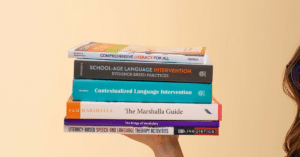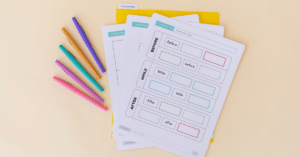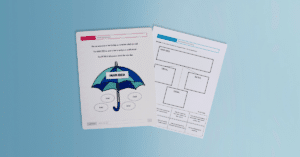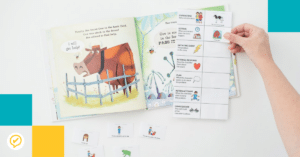I presented at the SLP Summit on curriculum-based therapy. One hour definitely wasn’t enough time to cover all facets of curriculum-based therapy, so I started a series of videos to answer your questions!
This week is all about selecting curriculum-based therapy targets. Check out the video below or skip ahead to the text for a quick summary. I included time stamps in brackets, in case you want to jump to a particular question.
If you want some freebies to help you get started with curriculum-based therapy, then sign up here!
Questions Answered in the Video
[1:14] Are the IEP goals different than usual when using a curriculum-based approach?
It depends on what your goals look like now. I shared strategies to collect meaningful data during the SLP Summit presentation (e.g., collecting work samples, curriculum-based assessments, classroom observations, language samples, teacher/parent/student input). If we’re creating goals based on that information, then we’re good to go when it comes to curriculum-based therapy!
[4:40] What do you do when the teacher goals and the parent goals don’t align?
We get to investigate! Why do the teacher and the parent have different goals? What is the teacher seeing in the classroom? What does the parent see at home? With a little bit of counseling, we can find common ground and find a way to move forward.
[5:44] How do you consider relevant curriculum-based goals for our learning support students who may always struggle? Do we ensure they have targeted skills with simpler words since grade level words are (most likely) too difficult?
We can look at the explicit, as well as the implicit, curriculum to find ways to best support these students. What can we do to help them access the curriculum and participate in meaningful ways?
[7:00] Do you use only reading/writing curriculum or all areas?
I use all areas! I work with the teacher to find relevant activities to support. That may include vocabulary lists and reading passages, but it can also include activities like math word problems and science experiments. The possibilities are endless!
[11:50] How do you maintain CBT from week to week when the curriculum moves so quickly?
I don’t try to do it all! We have the luxury of moving at the student’s pace. As long as we’re focusing on building skills, it doesn’t matter if we’re targeting everything. If we’re working towards generalization, then they’ll be able to apply their skills to other parts of the curriculum soon enough!
[13:05] Are you working mostly in themes or the actual material from the classroom?
It depends!
I usually don’t have any trouble finding fun, engaging, and relevant materials for my older students.
I personally have a harder time pulling activities from the curriculum for my younger students. Instead, I find out what the teacher is reading in class. They often read the fun, engaging books that we love to use in therapy! For example, some of my kindergarten teachers regularly read the Old Lady books and fairy tales. As long as I know what they’re reading, I can pull a book guide to supplement what the students are learning in class. If they’re not reading a particular book, then I ask the teacher if they’re covering a particular theme (e.g., holidays, animals, weather, etc.). There’s always something to target!
Hint: SLP Now makes this super easy! The membership currently includes materials for 48 different themes and 97 books.
[15:46] If you have two students working on different goals (like one working on context clues and one working on grammar), do you focus on one at a time or more of a round robin approach?
My favorite answer: it depends! I generally use a round robin approach, but some students may need more targeted support initially. In that case, the entire group might focus on the one skill (providing awesome models and peer support). If it makes more sense to give individual support, then I might give the other students a task to work on independently.
Bonus Questions
If a teacher says the student is having a lot of trouble with wh- questions and inferencing, would you use the material the student already had trouble with or something else?
I use whatever the teacher is willing to share. If the student is struggling to answer inferential questions in science, then they’re probably struggling in language arts, as well. We get to use our clinical judgment (and the teacher’s input) to decide on the materials that would be most helpful.
Have you had any experience using the curriculum in the therapy room? My school’s speech schedule is during the teacher planning times for each grade. We cannot be in the classroom because we must see our students during their exploratory time. I have pulled vocabulary from teachers in each grade to use, but any more than that takes more time than what I have: 30 minutes with five students in each group.
It’s great that you’re using vocabulary! If you’re able to use that to support your students’ goals, then that’s fine. No need to try to support everything!
That wraps up the questions for curriculum-based targets! Comment below if you have any ideas or questions to share!






Leave a Reply